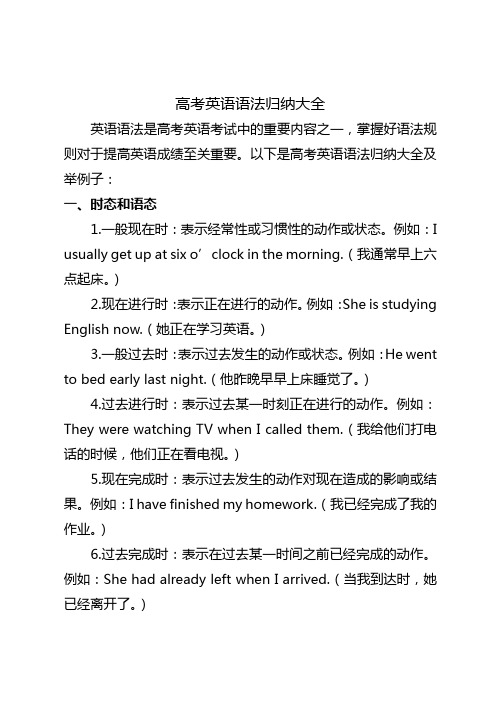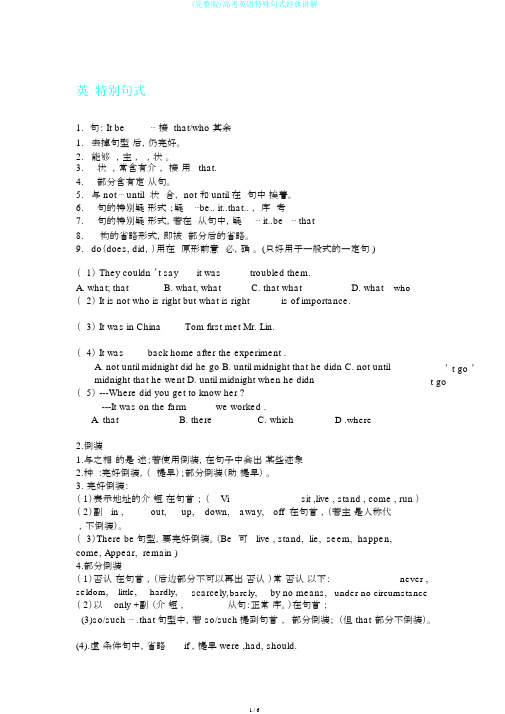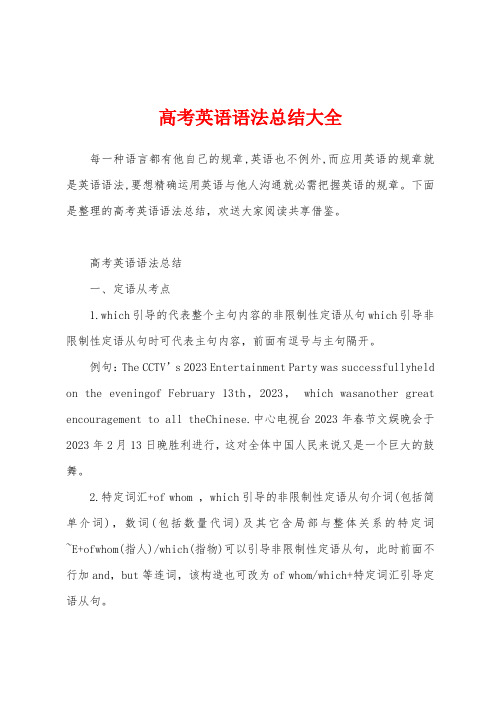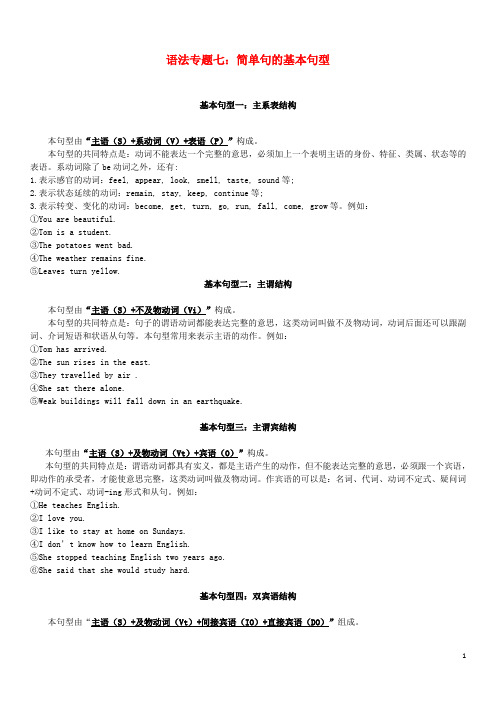高考语法专项英语句法(全,经典,有趣)
高考英语语法归纳大全

高考英语语法归纳大全英语语法是高考英语考试中的重要内容之一,掌握好语法规则对于提高英语成绩至关重要。
以下是高考英语语法归纳大全及举例子:一、时态和语态1.一般现在时:表示经常性或习惯性的动作或状态。
例如:I usually get up at six o’clock in the morning.(我通常早上六点起床。
)2.现在进行时:表示正在进行的动作。
例如:She is studying English now.(她正在学习英语。
)3.一般过去时:表示过去发生的动作或状态。
例如:He went to bed early last night.(他昨晚早早上床睡觉了。
)4.过去进行时:表示过去某一时刻正在进行的动作。
例如:They were watching TV when I called them.(我给他们打电话的时候,他们正在看电视。
)5.现在完成时:表示过去发生的动作对现在造成的影响或结果。
例如:I have finished my homework.(我已经完成了我的作业。
)6.过去完成时:表示在过去某一时间之前已经完成的动作。
例如:She had already left when I arrived.(当我到达时,她已经离开了。
)7.将来时:表示将要发生的动作或状态。
例如:We will go to the park tomorrow.(我们明天会去公园。
)8.被动语态:表示动作的承受者是主语。
例如:The book was written by him.(这本书是他写的。
)二、从句1.名词性从句:在句子中作主语、宾语、表语等成分的从句。
例如:What he said is true.(他说的是真的。
)2.定语从句:修饰先行词的从句。
例如:The man who is standing there is my father.(站在那里的人是我的父亲。
)3.状语从句:在句子中作时间、地点、原因、条件等状语的从句。
高考英语语法专项-非谓语固定搭配

近5年高考全国卷真题语法专项-非谓语固定搭配本考点是近几年高考全国卷中考查的要点,属于容易题,主要考查非谓语的固定搭配形式,如一些动词只能接doing作宾语,或一些动词只能接to do作宾语等。
考查形式:语法填空和短文改错。
1考点聚焦▪非谓语动词的句法功能▪2考点精讲1.非谓语doing作宾语①下列动词后只能接动名词:suggest, finish, avoid, stop, can’t help, mind, enjoy, require, practise, miss,escape, pardon, advise, consider, imagine, keep, appreciate, eacape, permit。
例如:I suggest playing football.( 即suggest +doing )②下列动词短语接动名词:leave off, put off, give up, look forward to, feel like, have trouble / difficulty(in) doing sth. devote to, get used to, pay attention to, be fond of, be worth。
例如:I am looking forward to visiting Beijing.③介词后要接动名词。
what about、how about、without、be fond of、be good at等介词后接动名词。
注意on / upon doing sth. = as soon as 引导的从中。
作此意讲时on / upon后也可以接名词。
如on his arrival…。
2. 非谓语to do作宾语(即某些动词后只能接to do作宾语)1)下列动词接不定式作宾语:afford、promise、refuse、expect、hope、learn、offer、wish、want、fail、plan、agree、forget、like、prefer、decide、manage、try、arrange、determine、desire等例如:She refused to finish the work last week.3.非谓语to do作定语,下列词语后常接不定式作定语:chance、wish、right、courage、need、promise、plan、opportunity、way、the first、the second、the last、the only等。
高中英语2025届高考语法复习句法知识讲解(主谓一致+动词时态+助动词)

高考英语语法复习句法知识讲解一、主谓一致在英文中,谓语的形式要与主语保持一致。
比如,你、我、他是学生,中文“是”字是一样的,只有主语不同。
英文的动词要根据主语不同而改变:I am,you are,he is。
主谓一致有三大原则:语法一致,意义一致,就近一致。
(一)语法一致名词是单数,谓语动词是单数。
不可数名词、集体名词、动词不定式、动名词等,谓语动词也用单数。
Knowledge is power. 知识就是力量。
The team is playing well. 这个团队表现得很好。
To see is to believe. 眼见为实。
Swimming is good exercise. 游泳是一项很好的运动。
记住:绝大多数都用单数,只有明确的复数名词,谓语动词才用复数。
My parents are teachers. 我的父母都是老师。
The shoes are all right. 这些鞋子很合适。
鞋、裤子、眼镜,只能是复数,如果前面加上“一双”“一条”,后面的动词就是单数。
A pair of glasses is very expensive. 一副眼镜很贵。
要想搞清楚谓语用单数还是复数,一定要准确锁定主语。
All except me in my family are going to the park. 很显然,all才是真正的主语,所以是复数。
She as well as the other girls is reading a book. 在这里,She才是真正的主语,所以是单数。
"more than one +名词"作主语时,谓语动词常用单数。
例如:More than one teacher gets the flowers."half of, the rest of, most of, all of, 百分数/分数+of +名词"作主语时,谓语动词形式根据of后的名词而定。
(完整版)高考英语特殊句式经典讲解

英特别句式1.句: It be⋯接that/who其余1.去掉句型后,仍完好。
2.能够,主,,状。
3.状,常含有介,接用 that.4.部分含有定从句。
5.与 not ⋯ until状合, not 和 until 在句中挨着。
6.句的特别疑形式;疑⋯be.. it..that.. ,序考7.句的特别疑形式,若在从句中,疑⋯ it..be ⋯ that8.构的省略形式,即被部分后的省略。
9.do(does, did,)用在原形前意必,确。
(只好用于一般式的一定句 )(1) They couldn ’t say ___it was _____troubled them.A. what; thatB. what, whatC. that whatD. what who (2) It is not who is right but what is right _____ is of importance.(3) It was in China ____Tom first met Mr. Lin.(4) It was ____back home after the experiment .A. not until midnight did he goB. until midnight that he didnC. not until midnight that he wentD. until midnight when he didn’ t go ’t go(5) ---Where did you get to know her ?---It was on the farm _____we worked .A. thatB. thereC. which D .where2.倒装1.与之相的是述;若使用倒装,在句子中会出某些迹象2.种 :完好倒装,(提早);部分倒装(助提早)。
3. 完好倒装:( 1)表示地址的介短在句首;( Vi sit ,live , stand , come , run )( 2)副 in , out,up, down, away, off 在句首,(若主是人称代,不倒装)。
高考英语语法知识点整理总结归纳

高考英语语法知识点整理总结归纳高考英语语法知识点整理总结归纳英语改错题目当中,连词错误,经常出现的是转折与承接的错误,也就是but与and应用错误,此外现在分词和过去分词的错误也是一直都出现的。
下面是小编为大家整理的高考英语语法知识点整理总结,希望对您有所帮助!高考英语语法知识点整理总结一、不定式做主语:1、不定式做主语一般表示具体的某次动作。
===动名词doing 表示习惯的,经常的动作。
e.g: To finish the building in a month is difficult.To do such things is foolish.To see is to believe. (对等)注: 1).不定式作主语时,谓语用单数2).当主语较长,谓语较短时,常用it做形式主语,而将不定式放到谓语的后面。
it做形式主语,不定式放在谓语动词之后常用于下列结构中:(1)It is/was +adj.+of sb. to do…(2) It is +adj.+for sb.+to do…It is easy / difficult / hard / foolish / unwise / right / wrong / unnecessary(3) it is +a +名词+ to do...It is a pity / a pleasure / a pleasant thing / one’s duty / an honor / a shame / a crime / no easy job… to doIt takes (sb.) some time / courage / patience …to do…It requires courage / patience / hard work… to do…注意: probable和possible均可作表语,但possible可以用不定式作真实主语,而probable不能用不定式作真实主语。
高考英语语法复习特殊句式-倒装句,强调句,反义疑问句,感叹句,祈使句,略和主谓一致)优质课件

名词前有little ,few, much, many修饰--用how感叹
many changes we have had in China these years !
Class Rules
Be sure to get here before nine. Please come here on time. Don’t be late.
Few people knew the news, ______?
Tom has never been to England, ________? 3.陈述句中含有not, no, hardly, neither, never, few, little, too…to等否定词或具有否定意义的词时,疑问部分常 用肯定形式。
表示请求、命令、叮嘱、邀请、劝告等的句子。
祈使句的肯定句一般由动词原形开头, 否定句以Don’t开头。
祈使句的应用
1. 否定的祈使句
Let's not laugh at other people. Don't let us miss Monique’s class. No fighting.
祈使句的否定句型: Don’t +v. 原形… Let’s not + v. 原形… No +v.-ing
7.在肯定的祈使句后,用 will you? would you? won’t you? 在否定的祈使句后,只能用 will you?
Let’s go, ______? Let us listen to Monique, ______? 8.在Let’s祈使句后加上 shall we?, 在Let us(me, him..) 后加上 will you? 或 won’t you?
高考英语语法总结大全

高考英语语法总结大全每一种语言都有他自己的规章,英语也不例外,而应用英语的规章就是英语语法,要想精确运用英语与他人沟通就必需把握英语的规章。
下面是整理的高考英语语法总结,欢送大家阅读共享借鉴。
高考英语语法总结一、定语从考点1.which引导的代表整个主句内容的非限制性定语从句which引导非限制性定语从句时可代表主句内容,前面有逗号与主句隔开。
例句:The CCTV’s 2023 Entertainment Party was successfullyheld on the eveningof February 13th,2023, which wasanother great encouragement to all theChinese.中心电视台2023年春节文娱晚会于2023年2月13日晚胜利进行,这对全体中国人民来说又是一个巨大的鼓舞。
2.特定词汇+of whom ,which引导的非限制性定语从句介词(包括简单介词),数词(包括数量代词)及其它含局部与整体关系的特定词~E+ofwhom(指人)/which(指物)可以引导非限制性定语从句,此时前面不行加and,but等连词,该构造也可改为of whom/which+特定词汇引导定语从句。
例句:Our English teacher has three daughters,all of whom /ofwhom all areconsiderate.我们的英语教师有三个女儿,个个都很善解人意。
3.由when.where引导的先行词隐藏度比拟高的定语从句历年的高考考察实践说明,增加定语从句难度的手段之一是增加先行词的隐藏度,如用point,case,situation等抽象的地点名词做先行词,当其在定语从句中做地点状语时用where引导定语从句的推断难度会增加,用occasion,period等表示抽象时间的名词做先行词,当其在定语从句中做时间状语时用when引导定语从句的判别难度也会增加。
高考英语 语法精讲精练 专题七 简单句的基本句型

语法专题七:简单句的基本句型基本句型一:主系表结构本句型由“主语(S)+系动词(V)+表语(P)”构成。
本句型的共同特点是:动词不能表达一个完整的意思,必须加上一个表明主语的身份、特征、类属、状态等的表语。
系动词除了be动词之外,还有:1.表示感官的动词:feel, appear, look, smell, taste, sound等;2.表示状态延续的动词:remain, stay, keep, continue等;3.表示转变、变化的动词:become, get, turn, go, run, fall, come, grow等。
例如:①You are beautiful.②Tom is a student.③The potatoes went bad.④The weather remains fine.⑤Leaves turn yellow.基本句型二:主谓结构本句型由“主语(S)+不及物动词(Vi)”构成。
本句型的共同特点是:句子的谓语动词都能表达完整的意思,这类动词叫做不及物动词,动词后面还可以跟副词、介词短语和状语从句等。
本句型常用来表示主语的动作。
例如:①Tom has arrived.②The sun rises in the east.③They travelled by air .④She sat there alone.⑤Weak buildings will fall down in an earthquake.基本句型三:主谓宾结构本句型由“主语(S)+及物动词(Vt)+宾语(O)”构成。
本句型的共同特点是:谓语动词都具有实义,都是主语产生的动作,但不能表达完整的意思,必须跟一个宾语,即动作的承受者,才能使意思完整,这类动词叫做及物动词。
作宾语的可以是:名词、代词、动词不定式、疑问词+动词不定式、动词-ing形式和从句。
例如:①He teaches English.②I love you.③I like to stay at home on Sundays.④I don’t know how to learn English.⑤She stopped teaching English two years ago.⑥She said that she would study hard.基本句型四:双宾语结构本句型由“主语(S)+及物动词(Vt)+间接宾语(IO)+直接宾语(DO)”组成。
- 1、下载文档前请自行甄别文档内容的完整性,平台不提供额外的编辑、内容补充、找答案等附加服务。
- 2、"仅部分预览"的文档,不可在线预览部分如存在完整性等问题,可反馈申请退款(可完整预览的文档不适用该条件!)。
- 3、如文档侵犯您的权益,请联系客服反馈,我们会尽快为您处理(人工客服工作时间:9:00-18:30)。
7.我收到了笔友从澳大利亚寄来的信。
I received a letter from my pen friend in Australia.
8.Jim 还不会自己穿衣服。
Jim cannot dress himself.
9.我们大家都相信Jack 是一个诚实男孩。
All of us believe that Jack is an honest boy.
请判断正误
• 15. 每天下午有许多学生到图书馆来借书。 1)Every afternoon a lot of students come to the library to borrow books. 2)Every afternoon a lot of students come to the library borrow books.
谓
• • • • • • •
语
说明主语的动作,状态或特征。谓语 是动词.
你能找到各句的谓语动词吗? 1) The new term begins on the 1st of September. 2) She seemed tired. 3) What have you been doing? 4) What have you done? 5) He was often laughed at for this. 6) I’d rather he didn’t come tomorrow.
基本句型 (1) 主+谓:S+V
S+V
1. The sun rises. (rise-rose-risen 是vi,不能带O.) 2. The red sun rises. ( red修饰sun,作定语)
3. The red sun rises in the east. (状语Adverbial)
Translation 1.昨晚我写了一封信。
I wrote a letter last night.
2.今天下午我想同你谈谈。
I want to talk with you this afternoon.
3.这本书他读过多次了。
He has read this book many times.
4.他们成功地完成了计划。
They have carried out the plan successfully.
5.你们必须在两周内看完这些书。
You must finish reading these books in two weeks.
6.那位先生能流利地说三种语言。
That gentlemen can speak three languages fluently.
She made me a beautiful dress. She made a beautiful dress for me. 归纳: to侧重指动作的方向,表示朝着,向着, 对着某人。 for 侧重指动作的受益者,表示为了某人, 替某人。
常跟双宾语的动词有: (需借助 to 的) bring, give, lend, hand, offer, pass, pay, promise, return, send, show, teach, tell, write, ask,等。 (需借助for 的)buy, call, cook, choose, draw, find, get, make, order, sing, save, spare,等。
宾语
宾语通常在及物动词和介词的后面。 常常是名词、代词、数词、不定式(to do )、 找出下列各句的宾语: 动名词(V-ing)、从句等充当。 1) He knows the secret. (n.作宾语) 2) The student has improved his way of learning. (短语作宾语) 3) Every one eats a piece of cake. (同上) 4) They don’t know what they should do. (从句 作宾语) 5) I just want to understand why you can’t remember English words. (同4)
10.他不知道说什麽好。
He did not know what to say.
11.他每天早晨洗冷水澡。
He takes a cold bath every morning.
12.我开窗户你在意吗?
Do you mind my opening the window?
注意:带 V-ing 做宾语的动词有:
suggest, advise, stop, resist, enjoy, imagine,finish, escape, admit, excuse, delay, practise, consider, keep, mind, understand, avoid, miss, risk succeed in, be busy,be worth, be used to, give up, look forward to
Translation 1. 你应当努力学习。 You should study hard. 2. 她昨天回家很晚。 She went home very late yesterday evening. 3. 那天早上我们谈了很多。 That morning we talked a great deal. 4. 会议将持续两个小时。 The meeting will last two hours. 5. 在过去的十年里,我的家乡已经发生了巨大的 变化。 Great changes have taken place in my hometown in the past ten years.
基本句型(2)
主语+谓语+宾语 (S. + V. + O. ) 该句型的谓语动词必须是vt或vt的动词词 组;宾语必须是名词或相当于名词的成分。
翻译练习: 1.昨晚我写了一封信。 2.今天下午我想同你谈谈。 3.这本书他读过多次了。 4.他们成功地完成了计划。 5.你们必须在两周内看完这些书。 6.那位先生能流利地说三种语言。 7.我收到了笔友从澳大利亚寄来的信。 8.Jim 还不会自己穿衣服。 9.我们大家都相信Jack 是一个诚实男孩。 10.他不知道说什麽好。 11.他每天早晨洗冷水澡。 12.我开窗户你在意吗?
语法系列
英语句法(一)
一.英语句子的基本成分有8种:
主语 (subject) 谓语 (predicate) 宾语 (object) 定语 (attribute) 状语 (adverbial) 补语 (complement) 表语 (predicative) 同位语(Appositive)
主语:
可以是名词、代词、数词、不定式(to do)、 V-ing、从句等充当。主语一般在句首。 • • • • • • • 请找出各句的主语: 1) Mr. Chen is a well-known scientist. 2) He reads newspapers everyday. 3) Two and six is eight. 4) Smoking is harmful to health. 5) To swim in Kunming Lake is a great pleasure. 6) What we shall do next is not yet decided.
11. 爱丽丝很会游泳。 Alice swims very well. 12. 约翰的父亲昨晚去世了。 John’s father died last night. 13. 秋天有些鸟飞到南方去。 In autumn, some birds fly to the south. 14. 我的爷爷早晨起得很早。 My grandfather gets up early in the morning. 15. 每天下午有许多学生到图书馆来借书。
基本句型(3)
第一种结构:主语+谓语+宾语+宾语 (S. + V. + O.+O. ) 请观察:1)He brings me cookies every day. 如果意思不变,也可以怎么说呢? 2)He brings cookies to me every day. 即要借助于介词to或for
朗读: He brings me cookies every day. He brings cookies to me every day.
9. 这个盒子重五公斤。 This 10. 五年前我住在北京。 I
box weighs five kilos.
lived in Beijing five years ago.
11. 爱丽丝很会游泳。 12. 约翰的父亲昨晚去世了。 13. 秋天有些鸟飞到南方去。 14. 我的爷爷早晨起得很早。 15. 每天下午有许多学生到图书馆来借书。
Translation
你应当努力学习。 她昨天回家很晚。 那天早上我们谈了很多。 会议将持续两个小时。 在过去的十年里,我的家乡已经发生了巨大的 变化。 6. 这种事情全世界各地每天都在发生。 7. 1919年,在北京爆发了“五.四”运动。 8. 每天八时开始上课。 9. 这个盒子重五公斤。 10. 五年前我住在北京。 都在发生。
Things of that sort are happening all over the world every day.
7. 1919年,在北京爆发了“五.四”运动。
The May Fourth Movement broke out in Beijing in 1919. 8. 每天八时开始上课。Classes begin at eight every day.
注意:带 to do 做宾语的动词有:
